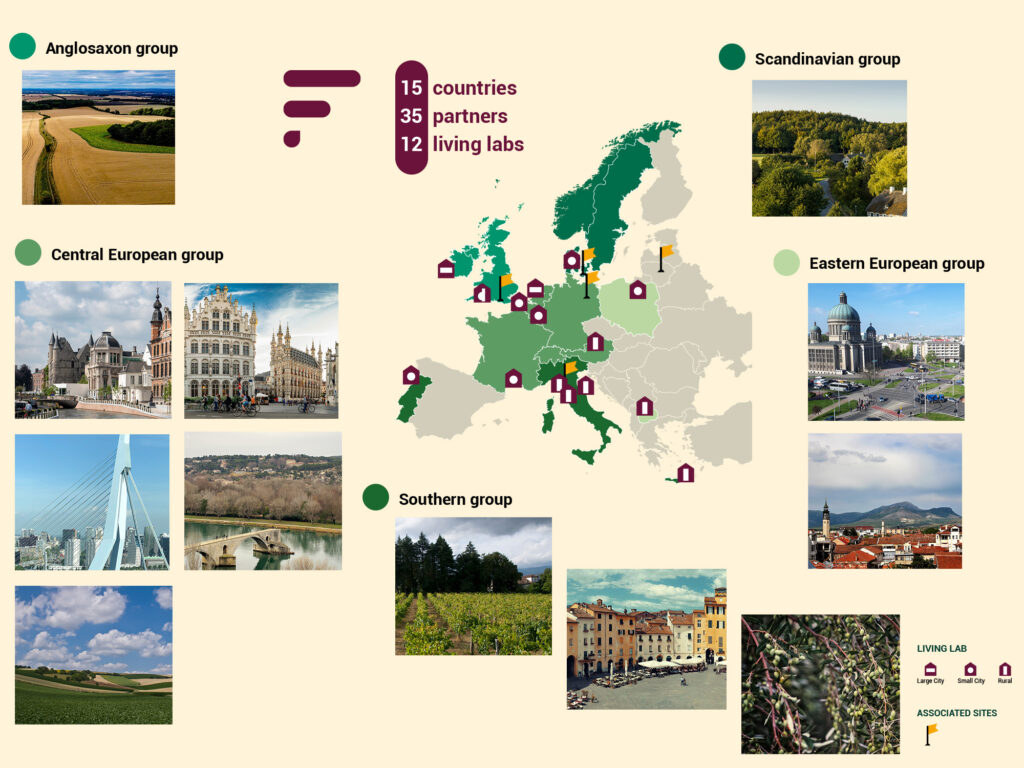Food systems that support transitions to healthy and sustainable diets

Through HORIZON-CL6-2021-FARM2FORK-01-15, FEAST (Food systems that support transitions to hEalthy And Sustainable dieTs) aims to support European food systems to shift away from the current ‘Lose-Lose-Lose-Win’ food systems that sees only large food corporations ‘winning’ at the expense of enormous negative consequences for the environment, health and the public sector.
FEAST aims to advance the state of the art by leveraging current best practice and co-designing novel solutions throughout Europe with food system stakeholders, including diverse vulnerable groups, to identify how they can be supported and empowered to facilitate and benefit from the just transition to healthier and more sustainable dietary behaviour – at all levels (micro, meso and macro) and in all sectors (producers, distributors, retailers and consumers) of the food system.
Experts agree that meeting climate change mitigation targets as articulated by the EU Green Deal will only be possible through a just transition to healthy diets produced by sustainable food systems – the impetus for the EU’s ‘Farm to Fork’ Strategy and the prioritisation of One Health approaches.
Discover the 12 Living Labs at this link.

Core activities
FEAST aims to advance the state of the art in research and innovation by bringing together different disciplines across the food system and, importantly, underpinning food actors’ behavioural dimensions, which is often missing in food system solutions. This approach will stimulate the co-creation of novel, practical and scalable community-based, technology-based and policy-based solutions.
FEAST is also committed to ensuring that the transition is just and equitable – vulnerable groups and those facing health inequalities will be front and centre in our project to ensure their needs are met and that food systems are augmented so that all of Europe’s citizens can benefit from healthier and more sustainably produced diets.
To achieve our ends, FEAST will deliver on four interlinked Objectives which will help us achieve our ambition of catalysing the transition to ‘Win-Win-Win-Win’ food systems in Europe over the five years of this project.
Objectives:
- Identify, understand and measure the barriers and facilitators that influence the dietary behaviour of different groups (particularly vulnerable groups in Europe), accounting for geographical, socio-economic, behavioural, gender and cultural differences.
- To co-create (ideation, design and testing) innovative and effective tools, programmes and strategies, including social innovations, in collaboration with key stakeholders in Europe that will enable consumers to make informed food choices that promote the self-management of healthier and more sustainable dietary behaviours and lifestyles.
- To empower individuals to lead healthier lives by adopting healthier and more sustainable dietary behaviours, choices and lifestyles through evidence-based strategies and tools that address all food system actors at the level of Member States, EU and wider international community.
- To boost the adoption of food and health policy interventions that aim to drive the transition to healthier and more sustainable diets by all stakeholders within the food system by using co-design and scientific testing of communication strategies, and associated monitoring approaches, that could be used by policymakers.
Major outputs
The outputs of the projects are:
- A large scale survey exploring barriers/facilitators to people eating healthier/more sustainable dietary behaviour
- Detailed analyses of food environment characteristics (public, private, community) that can serve as barriers or facilitators to transitions to healthier and more sustainable dietary behaviour
- Co-created community based solutions across 11 living labs
- Co-created tech based solutions across 5 large cities
- Open source simulation and scenario models on the effects of food system policy measures on supporting transitions to healthier/more sustainable dietary behaviour
- Policy briefs on policy initiatives that can be used to actively transition to healthier/more sustainable food systems
Associated Living Labs
The project has 12 living labs – click to see their video presentations: